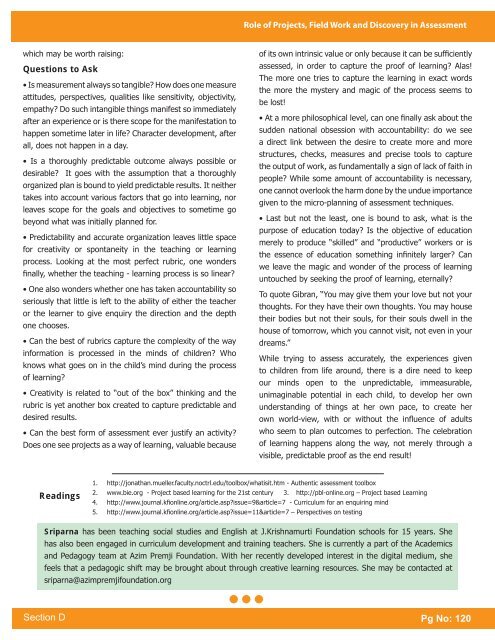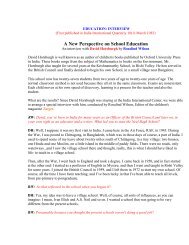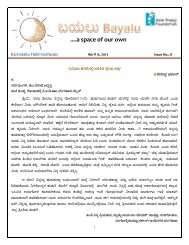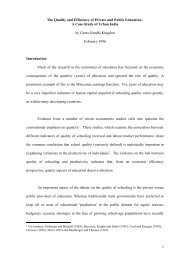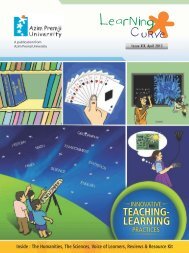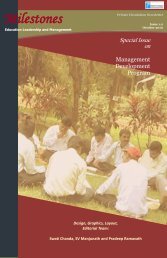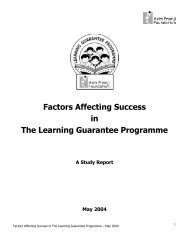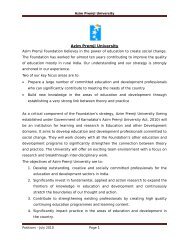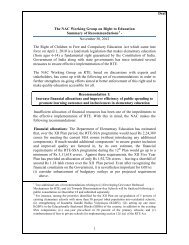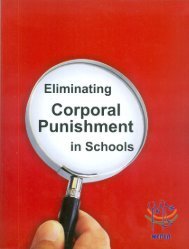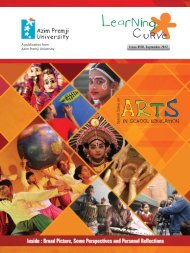Indesign Pagesnew.indd - Azim Premji Foundation
Indesign Pagesnew.indd - Azim Premji Foundation
Indesign Pagesnew.indd - Azim Premji Foundation
Create successful ePaper yourself
Turn your PDF publications into a flip-book with our unique Google optimized e-Paper software.
which may be worth raising:<br />
Questions to Ask<br />
• Is measurement always so tangible? How does one measure<br />
attitudes, perspectives, qualities like sensitivity, objectivity,<br />
empathy? Do such intangible things manifest so immediately<br />
after an experience or is there scope for the manifestation to<br />
happen sometime later in life? Character development, after<br />
all, does not happen in a day.<br />
• Is a thoroughly predictable outcome always possible or<br />
desirable? It goes with the assumption that a thoroughly<br />
organized plan is bound to yield predictable results. It neither<br />
takes into account various factors that go into learning, nor<br />
leaves scope for the goals and objectives to sometime go<br />
beyond what was initially planned for.<br />
• Predictability and accurate organization leaves little space<br />
for creativity or spontaneity in the teaching or learning<br />
process. Looking at the most perfect rubric, one wonders<br />
fi nally, whether the teaching - learning process is so linear?<br />
• One also wonders whether one has taken accountability so<br />
seriously that little is left to the ability of either the teacher<br />
or the learner to give enquiry the direction and the depth<br />
one chooses.<br />
• Can the best of rubrics capture the complexity of the way<br />
information is processed in the minds of children? Who<br />
knows what goes on in the child’s mind during the process<br />
of learning?<br />
• Creativity is related to “out of the box” thinking and the<br />
rubric is yet another box created to capture predictable and<br />
desired results.<br />
• Can the best form of assessment ever justify an activity?<br />
Does one see projects as a way of learning, valuable because<br />
Readings<br />
Role of Projects, Field Work and Discovery in Assessment<br />
of its own intrinsic value or only because it can be suffi ciently<br />
assessed, in order to capture the proof of learning? Alas!<br />
The more one tries to capture the learning in exact words<br />
the more the mystery and magic of the process seems to<br />
be lost!<br />
• At a more philosophical level, can one fi nally ask about the<br />
sudden national obsession with accountability: do we see<br />
a direct link between the desire to create more and more<br />
structures, checks, measures and precise tools to capture<br />
the output of work, as fundamentally a sign of lack of faith in<br />
people? While some amount of accountability is necessary,<br />
one cannot overlook the harm done by the undue importance<br />
given to the micro-planning of assessment techniques.<br />
• Last but not the least, one is bound to ask, what is the<br />
purpose of education today? Is the objective of education<br />
merely to produce “skilled” and “productive” workers or is<br />
the essence of education something infi nitely larger? Can<br />
we leave the magic and wonder of the process of learning<br />
untouched by seeking the proof of learning, eternally?<br />
To quote Gibran, “You may give them your love but not your<br />
thoughts. For they have their own thoughts. You may house<br />
their bodies but not their souls, for their souls dwell in the<br />
house of tomorrow, which you cannot visit, not even in your<br />
dreams.”<br />
While trying to assess accurately, the experiences given<br />
to children from life around, there is a dire need to keep<br />
our minds open to the unpredictable, immeasurable,<br />
unimaginable potential in each child, to develop her own<br />
understanding of things at her own pace, to create her<br />
own world-view, with or without the infl uence of adults<br />
who seem to plan outcomes to perfection. The celebration<br />
of learning happens along the way, not merely through a<br />
visible, predictable proof as the end result!<br />
1. http://jonathan.mueller.faculty.noctrl.edu/toolbox/whatisit.htm - Authentic assessment toolbox<br />
2. www.bie.org - Project based learning for the 21st century 3. http://pbl-online.org – Project based Learning<br />
4. http://www.journal.kfi online.org/article.asp?issue=9&article=7 - Curriculum for an enquiring mind<br />
5. http://www.journal.kfi online.org/article.asp?issue=11&article=7 – Perspectives on testing<br />
Sriparna has been teaching social studies and English at J.Krishnamurti <strong>Foundation</strong> schools for 15 years. She<br />
has also been engaged in curriculum development and training teachers. She is currently a part of the Academics<br />
and Pedagogy team at <strong>Azim</strong> <strong>Premji</strong> <strong>Foundation</strong>. With her recently developed interest in the digital medium, she<br />
feels that a pedagogic shift may be brought about through creative learning resources. She may be contacted at<br />
sriparna@azimpremjifoundation.org<br />
Section D<br />
Pg No: 120<br />
25


